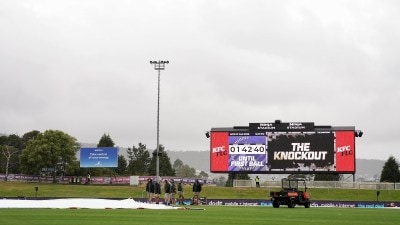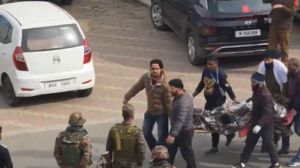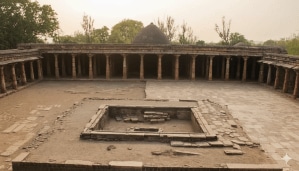A new beginning from Colombo
Within hours of this being read, Atal Behari Vajpayee and Nawaz Sharif could, indeed should, be talking in Colombo. They will have a SAAR...

Within hours of this being read, Atal Behari Vajpayee and Nawaz Sharif could, indeed should, be talking in Colombo. They will have a SAARC agenda before them, but this will only progress if there is some assurance that an India-Pakistan stand-off is not on the cards with both sides having abandoned the earlier charade of talking about talks and getting down to talk.
They need to talk not because a nuclear war is otherwise imminent over Kashmir 8212; this can safely be ruled out 8212; or because they are being pushed into it by Bill Clinton or anybody else, but because negotiations on the whole range of issues dividing them are long overdue. It should not take them much time to agree on an overall framework of discussions and instruct their foreign secretaries and/or other plenipotentiaries to get on with it.
Neither side should seek to impose any conditions. The Jammu and Kashmir question must obviously figure. This is the quot;corequot; issue for Pakistan and obviously cannot be relegated. Nor is there any reason todo so. As India insists on the Simla process, it must remember that the Simla Agreement specifically inscribed Kashmir as an item awaiting resolution.
There is certainly merit in taking the Kashmir bull by the horns without fussing about the number of working groups that meet, and when or where. Once the eight or whatever working groups commence their task, some groups will find progress easier. The nature of each problem or basket of problems will determine the emerging complexion and pace of the negotiations. These need not be inter-linked and it should be possible to implement agreed recommendations under each head without waiting for a grand accord on absolutely everything.
In other words, progress on less prickly issues should not become hostage to a resolution of the most difficult and sensitive issue 8212; Kashmir. Therefore, simultaneity in discussion of all eight baskets could well lead to a natural sequencing and early conclusions on certain issues which should not then be aborted in the name ofequal progress on all fronts. This would be a foolish quot;principlequot; to adopt provided there is also agreement on negotiations in good faith in respect of every item.
Early agreements quickly implemented will be confidence-building and create an environment conductive to faster progress on the issues that remain. It requires no clairvoyance to know that Kashmir is the sticky problem. It will take time even to move from two very divergent political and emotional perceptions of the what, why and when of that question to the substantive issue of what now. The history, ultimately, had best be left to historians.
Overt nuclear parity rules out war. There are no military solutions, internal or external. Nor has side-stepping, howsoever deft the dancing, proved completely or finally evasive. The nature of the dispute can be questioned, not the fact. And both sides will have to admit sooner or later that it has an internal as well as an international dimension. For each, Jamp;K has become a defining reality of theirsense of nationhood. Each may denounce the other8217;s perception. But these perceptions are a reality that will not go away and with which they must contend.
Finally therefore, both sides must accept current ground realities and proceed from that premise. This will not be easy. Pakistan will need to abandon cross-border support to militancy across the LOC. It cannot war, war and jaw, jaw at the same time.
What then is the ground reality? Jamp;K is an artificial construct, a plural political conglomerate that happened in history but was undone in 1947-48. It has been divided over the past half-century along the Line of Control which, whether by accident or design, broadly demarcates an ethno-cultural boundary. The plea that the Kashmiris must decide confuses an ethnic with a political label. The Kashmiris are essentially confined to the Valley and adjacent districts within India.
The UN resolutions were rooted in a given time and situation. Why they were not implemented has been a matter of bitter contention.They cannot be selectively cited today. Those resolutions are dead. This too is a reality.
What then? This is where the talks must move from the past to the future, from bitterness to trust, from emotion to reason, from tired all-or-nothing rhetoric that perpetuates a mutually unsatisfactory status quo to something both sides can live with, with honour, and which the Kashmiris too would be happy to accept. This has to be a creative departure towards some kind of sharing within existing sovereignties. Independence can be completely ruled out.
What kind of sharing and how much? How to set about it and when? With what guarantees and linkages? All this will constitute the new agenda after history has been amply rehearsed. Elements of the final solution will evolve and unfold as the political climate improves and domestic opinion all round, including both sides of Jamp;K, comes to recognise practical options that serve the common good. Public education is needed, not propaganda. The movement described will enableSAARC to grow even as it is enhanced by the latter.
The status quo is inimical to both sides. India may be stronger, but it cannot win. Nor can it take comfort from Pakistan failing economically or disintegrating politically. This would pose new dangers and destabilise South Asia and invite foreign intervention. A strong and stable Pakistan is in India8217;s highest interest.
- 01
- 02
- 03
- 04
- 05































